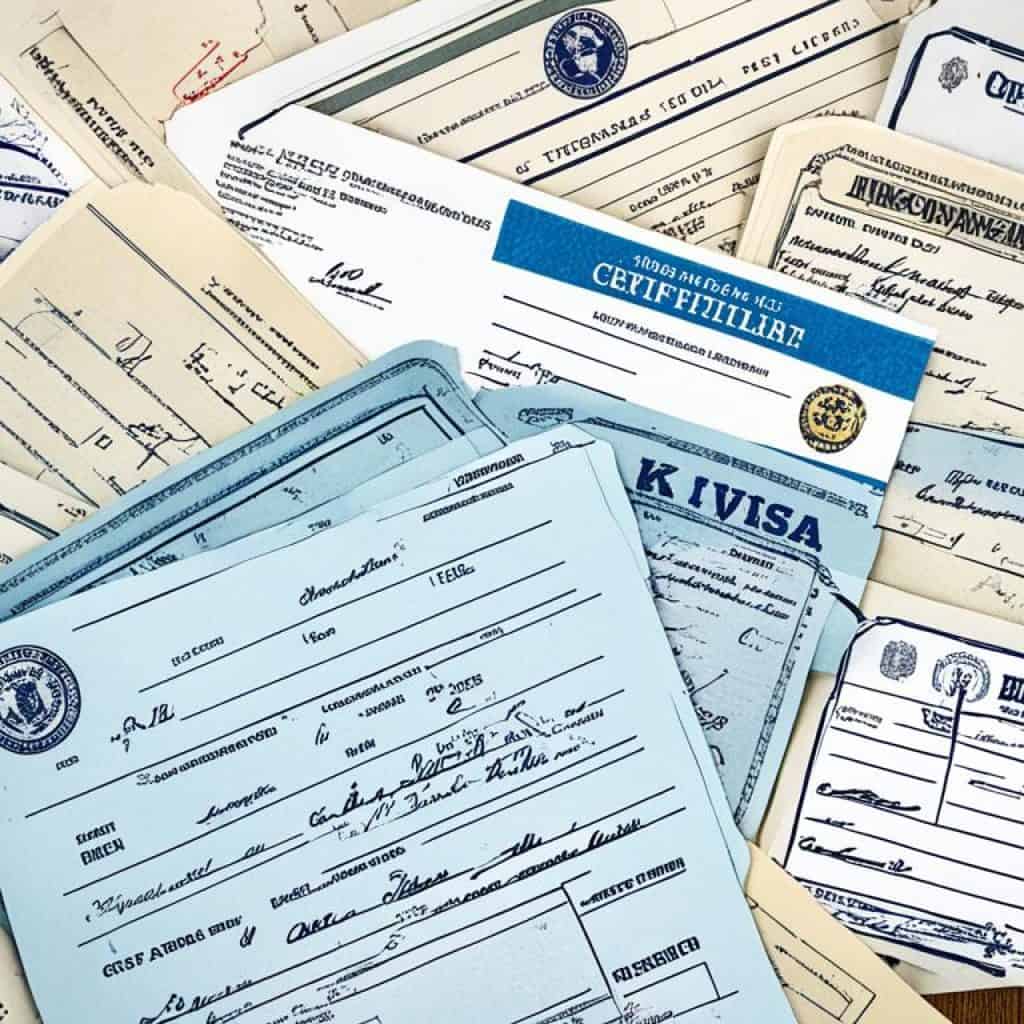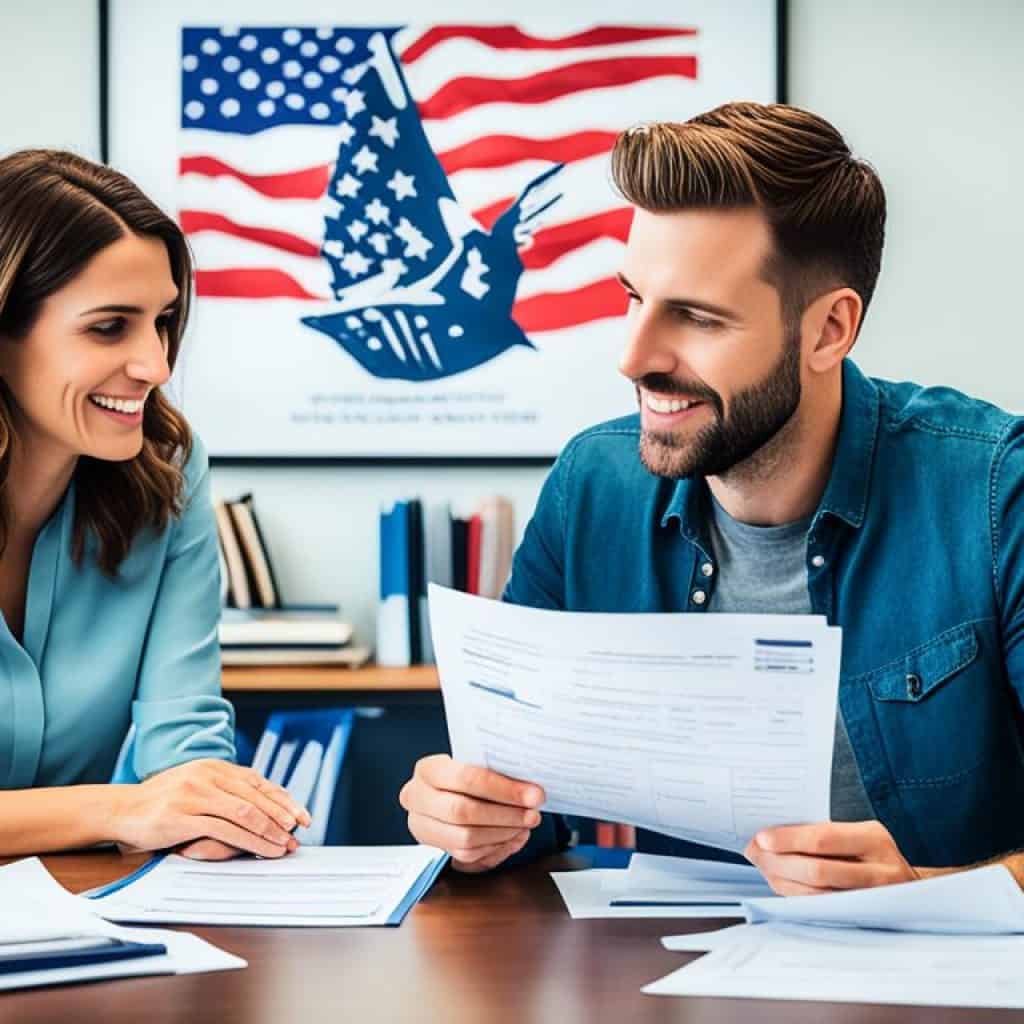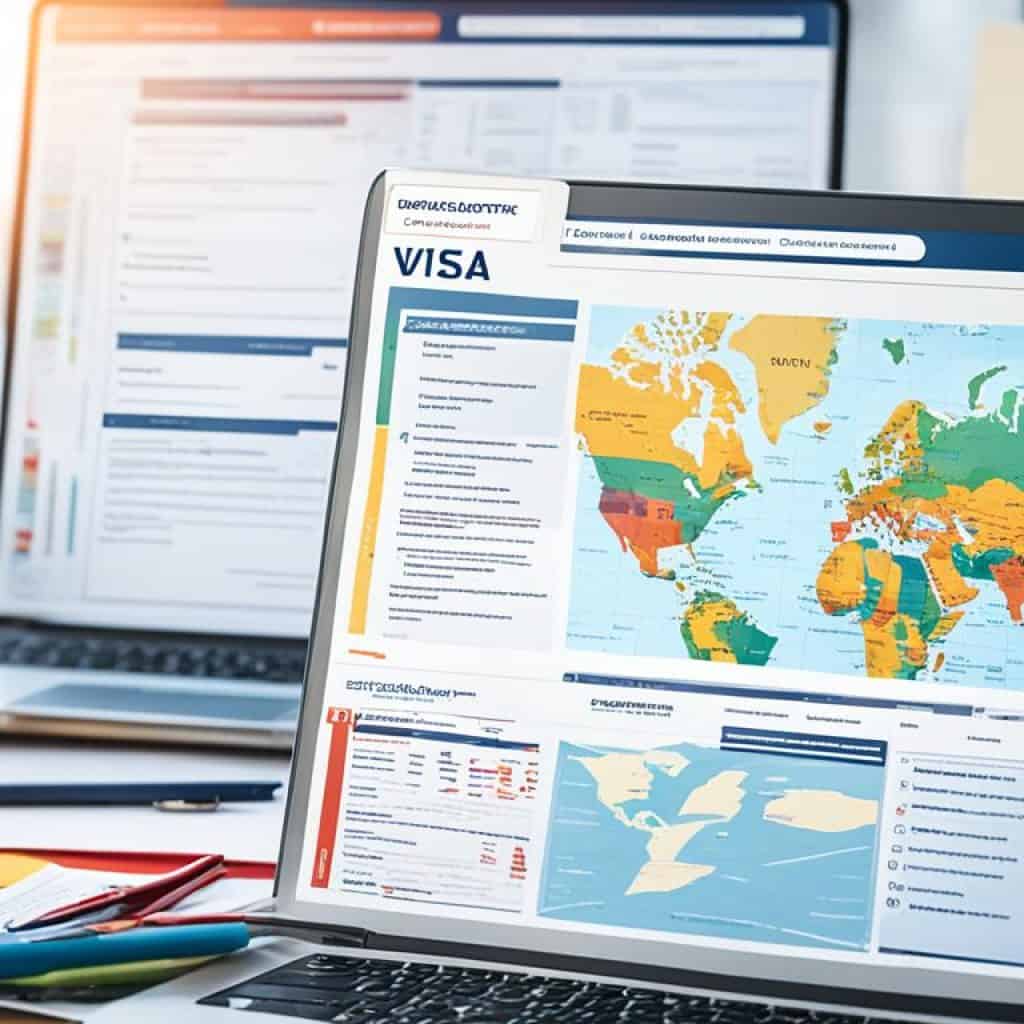Are you and your partner planning to get married in the United States? The K1 visa, also known as the Fiancé visa, can help make your dreams come true. But where do you start? How does the application process work? And what are the requirements you need to meet?
In this comprehensive guide, we will walk you through the entire K1 visa application process. From filing the necessary forms to attending the visa interview, we will provide you with all the information you need to successfully navigate the K1 visa journey. Whether you’re a U.S. citizen sponsoring your foreign fiancé or a couple exploring the options for bringing your relationship to the United States, this guide is designed to help you every step of the way.
Key Takeaways:
- The K1 visa allows a United States citizen to bring a fiancé or fiancée to the United States for marriage and lawful permanent residency.
- The K1 visa application process involves filing Form I-129F, undergoing background checks, and attending a visa interview.
- Required documents for a K1 visa application include passports, birth certificates, police certificates, and evidence of the relationship.
- The K1 visa interview is a crucial step in the process, where the couple’s relationship will be assessed.
- Once in the United States, the foreign fiancé(e) must marry the U.S. citizen petitioner and apply for Adjustment of Status to obtain lawful permanent residence (Green Card).
K1 Visa Eligibility Requirements
To obtain a K1 visa, the petitioner (U.S. citizen) must meet certain requirements and file Form I-129F. The eligibility criteria include:
- Free to Marry: Both the petitioner and the foreign national fiancé(e) must be legally free to marry.
- Intent to Marry: Both parties must be able to demonstrate a genuine intent to marry within 90 days of the foreign national’s admission to the United States.
- In-Person Meeting: The petitioner and the fiancé(e) must have met each other in person at least once within the 2 years prior to filing the petition. However, there are exceptions to this requirement, such as extreme hardship or cultural/religious reasons.
- General Immigration Requirements: The couple must meet the general immigration requirements, which include being legally free to marry, having no history of criminal activities, and not being subject to any inadmissibility grounds.
The purpose of these eligibility requirements is to ensure that the relationship is genuine and not entered into solely for immigration purposes. Meeting these criteria helps establish the legitimacy of the engagement and strengthens the chances of a successful K1 visa application.
It is important to note that each case is unique, and it is advisable to consult an immigration attorney to ensure compliance with the specific requirements and to navigate any exceptional circumstances.
Example Eligibility Exception:
In some cases, the in-person meeting requirement may be waived if the couple can demonstrate extreme hardship or if it goes against cultural or religious practices. These exceptions are evaluated on a case-by-case basis, and the couple must provide documented evidence to support their claim.
K1 Visa Eligibility Requirements Table
| Eligibility Requirements | Description |
|---|---|
| Free to Marry | Both parties must be legally free to marry. |
| Intent to Marry | Both parties must have a genuine intent to marry within 90 days of the foreign national’s admission to the United States. |
| In-Person Meeting | The couple must have met in person within the 2 years prior to filing the petition, unless exempted due to extreme hardship or cultural/religious reasons. |
| General Immigration Requirements | The couple must meet the general immigration requirements, such as being legally free to marry and not having any inadmissibility issues. |
K1 Visa Application Process
The K1 visa application process is a series of steps that must be followed to successfully obtain a K1 visa for your fiancé(e). This process involves filing the necessary forms, providing supporting documents, undergoing background checks, and attending a visa interview. Here is a step-by-step breakdown of the K1 visa application process:
Filing the Petition
The first step in the K1 visa application process is filing Form I-129F with the United States Citizenship and Immigration Services (USCIS). This form serves as a petition for your fiancé(e) to enter the United States as a K1 nonimmigrant. Along with the form, you will need to provide supporting documents and evidence of your relationship, such as photographs, letters, and travel itineraries.
Background Checks and Adjudication
Once the petition is filed, USCIS will conduct background checks on both you and your fiancé(e) as part of the adjudication process. This is done to ensure that both parties meet the eligibility requirements for the K1 visa. The background checks may include criminal record checks, security screenings, and verification of the supporting documents provided.
National Visa Center (NVC) Processing
If your petition is approved by USCIS, it will be forwarded to the National Visa Center (NVC) for further processing. The NVC will review the petition and ensure that all the necessary documents are complete and accurate. Once the NVC is satisfied, they will send the petition to the U.S. Embassy or Consulate in your fiancé(e)’s home country.
K1 Visa Application
Once the petition reaches the U.S. Embassy or Consulate, your fiancé(e) will need to complete Form DS-160, an online visa application form. This form collects biographic information and details about the purpose of the visit to the United States. Your fiancé(e) will also need to undergo a medical examination conducted by an authorized physician.
Visa Interview
After completing the visa application and medical examination, your fiancé(e) will be scheduled for a visa interview at the U.S. Embassy or Consulate. During the interview, a consular officer will ask questions about the relationship, the intent to marry, and other relevant details. It is important to provide truthful and accurate answers during the interview.
K1 Visa Issuance
If the visa interview is successful and the consular officer approves the application, your fiancé(e) will be issued a K1 visa. This visa allows your fiancé(e) to travel to the United States and seek admission. The K1 visa is generally valid for 6 months and allows a single entry into the United States.
Here is an overview of the K1 visa application process:
| Step | Description |
|---|---|
| 1 | Filing the Petition with USCIS |
| 2 | Background Checks and Adjudication |
| 3 | NVC Processing |
| 4 | K1 Visa Application |
| 5 | Visa Interview |
| 6 | K1 Visa Issuance |
It is important to note that the K1 visa application process can vary in length, and the timeline for approval may depend on factors such as the complexity of the case and the workload of the relevant agencies. However, on average, the process takes around 6 to 9 months from the initial filing of the petition to the issuance of the K1 visa.
With careful preparation and attention to detail, you can navigate the K1 visa application process successfully and bring your fiancé(e) to the United States to start your life together.
K1 Visa Required Documents
When applying for a K1 visa, it is crucial to gather all the necessary documents to support your application. Here is a list of the required documents:
- Completed Form DS-160: This form is used to gather biographical information about the visa applicant.
- Valid Passport: A passport that is valid for at least six months beyond the intended period of stay in the United States.
- Birth Certificate: A copy of the birth certificate of the foreign fiancé(e) showcasing their date and place of birth.
- Divorce or Death Certificates: If either the U.S. citizen petitioner or the foreign fiancé(e) has been previously married, documents proving the termination of any previous marriages, such as divorce or death certificates, must be provided.
- Police Certificates: A certificate of good conduct, also known as a police certificate, from the foreign fiancé(e)’s country of residence for the past six months or longer.
- Medical Examination Results: An official medical examination report conducted by an authorized physician to confirm the foreign fiancé(e)’s health and vaccination records.
- Proof of Financial Support: Evidence demonstrating that the U.S. citizen petitioner can financially support the foreign fiancé(e) upon their arrival in the United States. This can include recent tax returns, employment letters, bank statements, or a Form I-134 Affidavit of Support.
- Photographs: Two recent passport-sized photos of both the U.S. citizen petitioner and the foreign fiancé(e).
- Evidence of the Relationship: Documentation proving the bona fide nature of the relationship, such as photographs together, travel itineraries, joint bank account statements, or correspondence, including letters, emails, and text messages.
During the K1 visa interview, it is crucial to bring both the originals and clear, legible photocopies of all these documents. The consular officer may request additional information or specific documents during the interview. It’s important to be well-prepared and organized to ensure a smooth visa application process.
Note: For a complete checklist of required documents and any additional instructions, it is recommended to review the specific guidelines provided by the U.S. Embassy or Consulate where the visa interview will take place.

K1 Visa Interview Process
During the interview, the officer will carefully review the application and supporting documents provided. They will ask questions about the relationship to assess its authenticity and determine if the couple meets the eligibility criteria. It is essential to provide truthful and accurate answers, as any inconsistencies or misrepresentations could lead to a visa denial.
The interviewing officer may ask questions about how the couple met, their future plans, and their knowledge of each other’s background. They may also inquire about previous marriages and divorces, financial arrangements, and any cultural or religious differences.
It is essential for the couple to be well-prepared for the interview. They should review their application and supporting documents beforehand to familiarize themselves with the details. Additionally, practicing answering sample questions can help alleviate any nerves and ensure clear and concise responses.
The K1 visa interview aims to ensure that the couple is genuinely in a committed relationship and intends to marry within the required timeframe. The officer’s assessment of the couple’s credibility is crucial in determining if the K1 visa will be approved.
Remember, honesty and transparency are key during the interview process. Providing accurate information and demonstrating a genuine relationship will significantly increase the chances of a successful K1 visa application.
Common Questions Asked During the K1 Visa Interview
While the specific questions asked during the interview may vary, here are some common ones:
- How and when did you and your fiancé(e) meet?
- How long have you been in a relationship?
- Have you met each other’s families?
- What are your wedding plans?
- How do you communicate with each other when you are apart?
- What do you know about each other’s backgrounds, such as family, education, and employment history?
- Do you have any cultural or religious differences?
- What are your future plans as a married couple?
It is crucial for the couple to answer these questions honestly and confidently, providing detailed information that supports the authenticity of their relationship.
Preparing for the K1 Visa Interview
To ensure a smooth and successful K1 visa interview, couples should consider the following preparation tips:
- Review all documents: Familiarize yourself with the application and supporting documents to ensure you can provide accurate information.
- Practice interview questions: Prepare answers to potential interview questions to build confidence and improve communication during the interview.
- Bring original documents: Bring original copies of all required documents to the interview, including passports, birth certificates, and relationship evidence.
- Dress appropriately: Dress in formal or business attire to demonstrate professionalism and respect for the interview process.
- Arrive early: Arriving early at the embassy or consulate will allow time to go through security checks and gather your thoughts before the interview.
K1 Visa Interview Tips
Here are some additional tips to help make the K1 visa interview a success:
- Be confident: Maintain a confident and calm demeanor throughout the interview. Speak clearly and respectfully to the interviewing officer.
- Be honest: Answer all questions truthfully and provide accurate information. Attempting to conceal or provide false information can lead to serious consequences.
- Bring additional evidence: If you have any additional evidence of your relationship, such as photos, travel itineraries, or joint financial documents, bring them to the interview to further support your case.
- Maintain eye contact: Maintain eye contact with the interviewing officer to convey sincerity and build rapport.
- Stay organized: Keep your documents organized during the interview, making it easy to provide requested information promptly.
By adequately preparing for the K1 visa interview, couples can approach the process with confidence and increase their chances of a successful outcome. Remember, the interviewing officer’s main goal is to ensure the authenticity of the relationship and guarantee that the couple meets the requirements for the K1 visa.
K1 Visa Cost and Fees
When applying for a K1 visa, it is essential to consider the associated costs and fees. The total expense of obtaining a K1 fiancé visa may vary depending on individual circumstances, location, and additional service requirements.
Filing Fee for Form I-129F
One of the primary fees to be aware of is the filing fee for Form I-129F. As of the latest information available, the filing fee for this form is $535.
Medical Examination Fees
Another cost to consider is the expenses related to the required medical examination. The medical examination must be conducted by an authorized physician and typically includes various tests and screenings to assess the applicant’s health. The specific fees for the medical examination may vary depending on the chosen medical facility and location.
Visa Application Fees
Additional Costs for Document Translation and Photocopying
Applicants should also take into account any additional costs related to document translation and photocopying. Certain documents may need to be translated into English, which can incur extra expenses. It is important to ensure that all documents required for the application are clear, legible, and appropriately translated.
Overall, the current estimated total cost for a K1 fiancé visa is approximately $800. However, it is crucial to review the specific instructions provided by the U.S. Embassy or Consulate handling the application for accurate and up-to-date information on payment methods and required fees.
| Expense | Estimated Cost |
|---|---|
| Filing Fee for Form I-129F | $535 |
| Medical Examination Fees | Varies |
| Visa Application Fee | $265 |
| Additional Costs for Document Translation and Photocopying | Varies |
| Total Cost | $800 (approximately) |
Note: The costs mentioned above are subject to change. It is advisable to consult the official U.S. government sources and the specific instructions provided by the U.S. Embassy or Consulate for the most accurate and up-to-date information regarding fees and expenses.
K1 Visa Timeline and Processing Time
Understanding the timeline and processing time for a K1 visa application is crucial for couples planning to reunite in the United States. Although the exact duration may vary depending on various factors, such as case complexity and agency workload, the average processing time is approximately six months.
The K1 visa application process involves several stages, including USCIS adjudication, NVC processing, and the visa interview at the U.S. Embassy or Consulate. Each step plays a vital role in determining the overall processing time. Let’s dive into each phase to gain a better understanding of the timeline:
USCIS Adjudication
After filing Form I-129F, the U.S. citizen petitioner must patiently await adjudication from USCIS. The USCIS reviews the petition, supporting documents, and conducts background checks. This initial stage can take several months, typically ranging from three to five months.
NVC Processing
Once the petition is approved by USCIS, it is forwarded to the National Visa Center (NVC) for additional processing. The NVC ensures the completeness of the required documentation and then transfers the case to the U.S. Embassy or Consulate in the foreign fiancé(e)’s home country. This step usually takes around one to two months.
Visa Interview
The final stage of the K1 visa application process is the visa interview. The foreign fiancé(e) attends the interview at the U.S. Embassy or Consulate, where a consular officer reviews the application, supporting documents, and assesses the relationship. The length of the interview varies, but it typically lasts around 15-30 minutes.
In most cases, the K1 visa is granted shortly after the interview, allowing the fiancé(e) to travel to the United States and get married within 90 days of admission.
Remember, these timelines are approximate and can be subject to change. Factors like case complexity, embassy workload, or any additional administrative processing can affect the overall processing time. It is crucial to stay patient, monitor the progress of the application, and consult with an immigration attorney if you encounter any delays or concerns.
K1 Visa Sponsor Responsibilities
As the U.S. citizen sponsor, you play a crucial role in the K1 visa application process. It is essential to understand your responsibilities and ensure compliance with the immigration laws. Here are the key areas where your involvement is needed:
Filing Form I-129F
Your first responsibility as a K1 visa sponsor is to file Form I-129F, the Petition for Alien Fiancé(e), with the U.S. Citizenship and Immigration Services (USCIS). This form establishes your relationship with your fiancé(e) and initiates the visa application process.
Providing Evidence of the Relationship
During the application process, you will need to provide evidence of your genuine relationship with your fiancé(e). This can include photographs, letters, emails, phone records, or any other documentation that demonstrates your ongoing relationship and intention to marry within 90 days of their entry to the United States.
Supporting the Foreign Fiancé(e) During the Interview
As the sponsor, you should encourage and support your fiancé(e) throughout the entire visa process. This includes preparing them for the visa interview, helping them review the required documents, and addressing any concerns or questions they may have. Your emotional support can make a significant difference in their confidence and success during the interview.
Financially Sponsoring the Fiancé(e)
Financial sponsorship is a critical responsibility of the K1 visa sponsor. You must demonstrate to the U.S. government that you have the financial means to support your fiancé(e) once they enter the United States. This includes providing evidence of your income, employment, and ability to meet the income requirements outlined by the U.S. Department of Homeland Security.
| Income Requirements | Number of People in Household (Including Sponsor) | Minimum Required Income (2021) |
|---|---|---|
| 1 | Sponsor Only | $17,240 |
| Sponsor + Fiancé(e) or Children | $21,550 | |
| 2 | Sponsor Only | $23,680 |
| Sponsor + Fiancé(e) or Children | $29,600 | |
| 3 | Sponsor Only | $29,120 |
| Sponsor + Fiancé(e) or Children | $36,400 |
It is vital to ensure that you meet these income requirements to avoid complications or delays in the visa application process.
By shouldering these responsibilities, you can support your fiancé(e) throughout the K1 visa application process and lay the foundation for a successful future together. Remember, maintaining open communication, genuine commitment, and compliance with the immigration requirements are key to achieving your shared goals.
Adjustment of Status for K1 Visa Holders
After entering the United States on a K1 visa and getting married to the U.S. citizen sponsor within 90 days, the foreign national spouse must apply for Adjustment of Status to obtain lawful permanent residence (Green Card).
This involves filing Form I-485 with USCIS and providing supporting documents, attending a biometrics appointment, and potentially attending an interview. If approved, the foreign national will receive a conditional Green Card valid for 2 years if the marriage was less than 2 years old at the time of approval, or a 10-year Green Card if the marriage was more than 2 years old.
| Adjustment of Status Process: | Timeline: |
|---|---|
| 1. File Form I-485 with USCIS and pay the filing fee. | Varies, but typically takes 7-12 months for processing. |
| 2. Attend a biometrics appointment to provide fingerprints and other biometric information. | Usually scheduled within a few weeks after filing. |
| 3. Attend an interview (if required) with USCIS. | Interviews are conducted for certain cases at the discretion of USCIS officers. |
| 4. Receive a decision from USCIS. | Varies, but typically takes a few weeks to a few months after the interview. |
| 5. Receive a conditional Green Card (if applicable) | If the marriage was less than 2 years old at the time of approval. |
| 6. Remove conditions on residence (if applicable) | If the marriage was more than 2 years old at the time of approval, the foreign national must file Form I-751 to remove the conditions on their Green Card. |
“The Adjustment of Status process allows K1 visa holders to officially become lawful permanent residents of the United States. It is an important step towards building a future together as a married couple.”
During the Adjustment of Status process, it is crucial to provide complete and accurate information, submit all required documents, and attend any requested appointments or interviews. Failure to comply with the requirements may result in delays or denial of the application.

By successfully completing the Adjustment of Status process, K1 visa holders can enjoy the benefits of lawful permanent residence, such as the ability to work, travel, and live in the United States indefinitely. It is essential to stay informed about the process and seek legal guidance if needed to ensure a smooth transition to permanent residency.
Removing Conditions on Residence
Conditional permanent residents who obtained their Green Cards through marriage to a U.S. citizen within 2 years of marriage must file a petition to remove the conditions on their residence. This involves filing Form I-751 and providing evidence of the continued bona fide marital relationship. USCIS will review the petition, conduct background checks, and potentially request an interview. If approved, the conditions on residence will be removed, and the foreign national will receive a 10-year Green Card.
| Evidence Required for Removing Conditions on Residence | Additional Information |
|---|---|
| Proof of joint ownership of property | – |
| Bank statements showing joint accounts | – |
| Lease or mortgage agreements | – |
| Tax returns filed jointly | – |
| Utility bills in both names | – |
| Documentation of joint financial obligations | – |
| Sworn affidavits from family and friends | – |
It is crucial to submit a comprehensive range of evidence to support the continued authenticity of the marriage. This can include documentation showing joint ownership of property, bank statements with joint accounts, lease or mortgage agreements, tax returns filed jointly, utility bills in both names, and evidence of joint financial obligations. Additionally, sworn affidavits from family and friends can help strengthen the case.
Only exceptional circumstances may exempt a conditional permanent resident from filing a joint petition. Examples include divorce, abuse, or the death of the U.S. citizen spouse. It is crucial to consult with an immigration attorney to understand the specific requirements and options in such cases.
Upon receiving the petition, USCIS will review the evidence and may request additional documentation or schedule an interview. It is important to respond promptly and provide any requested information. If the petition is approved, the conditional Green Card will be replaced with a 10-year Green Card, granting the individual permanent residence status in the United States.
Removing the conditions on residence is a crucial step for individuals who obtained their Green Cards through marriage to a U.S. citizen within 2 years. By gathering the necessary evidence and following the proper procedures, foreign nationals can successfully navigate this process and secure their long-term immigration status in the United States.
K1 Visa Denial and Appeals
In some cases, the K1 visa application may face denial by USCIS or the consular officer during the interview. Several reasons can lead to a K1 visa denial, such as failure to demonstrate a bona fide relationship, ineligibility due to criminal or immigration violations, or not meeting the necessary requirements.
If your K1 visa application is denied, it is essential to review the reasons for the denial. Understanding the specific grounds on which the application was denied can help you determine the best course of action.
In certain situations, you may have the option to appeal or request reconsideration of the denied application. Appealing a K1 visa denial involves presenting additional evidence or addressing the concerns that led to the denial. However, it is crucial to consult with an experienced immigration attorney to assess the strength of your case and ensure the appeals process is handled correctly.
An immigration attorney can guide you through the appeals process, advise on the appropriate evidence to gather, and help craft a strong argument to support your appeal. They will assist in preparing the necessary documents and submissions to present your case effectively.
Remember, the appeals process for a K1 visa denial can be complex, so having expert guidance is essential to increase your chances of a successful outcome. Consulting with an immigration attorney specializing in K1 visa appeals can provide the necessary support and expertise to navigate this challenging situation.
If you decide to proceed with an appeal, timely action is critical. Many visa appeals have strict deadlines, and failure to adhere to these deadlines can result in the appeal being dismissed.
Overall, while a K1 visa denial can be disheartening, it is essential not to lose hope. With the right legal guidance and perseverance, you may be able to overcome the denial and secure the K1 visa to reunite with your loved one in the United States.
If you received a K1 visa denial or have concerns about the application process, reach out to an immigration attorney who can evaluate your case and provide the guidance you need to move forward.
K1 Visa FAQ
Have questions about the K-1 visa application process? We’ve got you covered. Here are some frequently asked questions and comprehensive answers to help guide you through the K1 visa journey.
1. Do we need to meet in person before applying for a K-1 visa?
Yes, to be eligible for a K-1 visa, you must have met your fiancé(e) in person within the past two years before filing the petition. However, there are exceptions to this requirement for cases of extreme hardship or cultural/religious reasons.
2. What are the financial requirements for a sponsor?
As the sponsor, you must meet the income requirements to demonstrate the ability to financially support your fiancé(e) once they enter the United States. Typically, you need to have an income at or above 100% of the federal poverty guideline. In some cases, a joint sponsor may be necessary if the sponsor does not meet the income requirements.
3. Is a medical examination required for the K-1 visa?
Yes, your fiancé(e) is required to undergo a medical examination conducted by an authorized physician. The purpose of the examination is to ensure that your fiancé(e) is free from any communicable diseases or mental health conditions that would deem them inadmissible to the United States.
4. How long does the K-1 visa process take?
The processing time for a K-1 visa can vary, but on average, it takes around 6 months from filing the petition to visa issuance. This timeframe includes USCIS adjudication, NVC processing, and the visa interview at the U.S. Embassy or Consulate.
5. What happens if the K-1 visa application is denied?
If your K-1 visa application is denied, you may have options for appeal or reconsideration. It is important to carefully review the denial reasons provided and consult with an immigration attorney to determine the best course of action.
“The K-1 visa application process can be overwhelming, but with proper guidance and preparation, couples can successfully navigate the requirements and build a life together in the United States.”
If you have any more questions or need further guidance, consult with an immigration attorney who specializes in fiancé visas.
| Frequently Asked Questions | Answers |
|---|---|
| 1. Do we need to meet in person before applying for a K-1 visa? | Yes, to be eligible for a K-1 visa, you must have met your fiancé(e) in person within the past two years before filing the petition. |
| 2. What are the financial requirements for a sponsor? | The sponsor must meet the income requirements to demonstrate the ability to financially support the fiancé(e) once they enter the United States. |
| 3. Is a medical examination required for the K-1 visa? | Yes, your fiancé(e) is required to undergo a medical examination conducted by an authorized physician. |
| 4. How long does the K-1 visa process take? | The average processing time for a K-1 visa is around 6 months from filing the petition to visa issuance. |
| 5. What happens if the K-1 visa application is denied? | If the K-1 visa application is denied, there may be options for appeal or reconsideration. |
Resources for K1 Visa Applicants
Applying for a K1 visa can be a complex and overwhelming process. However, with the right resources and guidance, you can navigate through the requirements and successfully submit your application. To assist you in your journey, we have compiled a list of valuable resources, information, guides, and reviews that can provide you with the necessary support and knowledge to navigate the K1 visa application process.
K1 Visa Information Websites
- USCIS Official Website РFianc̩(e) Visa
- U.S. Department of State – K1 Visa Information
- VisaJourney – K1 Visa Guide
K1 Visa Application Guides
These resources offer valuable insights into the K1 visa application process, including detailed information on required documents, timelines, processing times, and frequently asked questions. Although each case is unique, these guides provide a solid foundation for understanding the overall process.
Reputable Immigration Services
“We highly recommend seeking assistance from reputable immigration services to help you with your K1 visa application. Their expertise and knowledge can significantly streamline the process and ensure all requirements are met.”
– Testimonial from a successful K1 visa applicant
K1 Visa Application Reviews
“Reading reviews from individuals who have successfully gone through the K1 visa application process can provide valuable insights and reassurance. Learning from their experiences can help alleviate any concerns or uncertainties you may have along the way.”
– Testimonial from a satisfied K1 visa applicant
Remember that while these resources can provide helpful information, it is always recommended to consult with an immigration attorney for personalized advice tailored to your specific circumstances. Their expertise and guidance can ensure a smooth and successful K1 visa application process.
| Resource | Description | Website |
|---|---|---|
| USCIS Official Website РFianc̩(e) Visa | Official USCIS information on the K1 visa process | Visit website |
| U.S. Department of State – K1 Visa Information | Official resources and guidance from the U.S. Department of State | Visit website |
| VisaJourney – K1 Visa Guide | Comprehensive guide with step-by-step instructions and community resources | Visit website |
| AllLaw РK1 Fianc̩ Visa Guide | Expert-authored guide covering various aspects of the K1 visa application | Visit website |
| Immihelp – K1 Visa Step-by-Step Guide | Detailed guide with practical tips and insights for the K1 visa process | Visit website |
| Boundless – K1 Visa Petition Guide | Comprehensive resources and tips for completing the K1 visa petition | Visit website |

Conclusion
The K1 visa application process can be complex and daunting, but with proper understanding, preparation, and guidance, couples can navigate through it successfully. By following the required steps and meeting the necessary criteria, you can increase your chances of a favorable outcome and realize your dream of bringing your fiancé or fiancée to the United States.
To ensure a smooth application process, it is crucial to familiarize yourself with the K1 visa requirements and gather all the necessary documents. Attention to detail is key, as even minor errors or omissions can lead to delays or, in some cases, rejection.
If you’re feeling overwhelmed or uncertain about the process, it’s advisable to seek guidance from reputable resources such as immigration attorneys, official government websites, and reliable immigration services. Their expertise and experience can provide valuable insights and support, helping you navigate the complexities of the application process.
Don’t underestimate the importance of the K1 visa interview. This is an opportunity for the consular officer to assess the genuineness of your relationship. Be prepared to answer questions about your relationship history, future plans, and any other relevant details. Stay calm, be truthful, and emphasize the authenticity and strength of your bond.
Remember that obtaining a K1 visa is just the first step towards building a life together in the United States. Once your fiancé or fiancée arrives, you will need to navigate the Adjustment of Status process to obtain lawful permanent residence. It’s important to stay informed about the requirements and deadlines for this next phase in your journey.
Ultimately, obtaining a K1 visa can open up a world of possibilities for you and your loved one. By ensuring a well-prepared and thorough application, you can embark on this exciting chapter of your lives together, creating lasting memories and building a future in the United States.
| K1 Visa Application | Fiancé visa process | Fiancé visa requirements | K1 visa interview | K1 visa documents |
|---|---|---|---|---|
| Understanding the requirements | Step-by-step walkthrough of the process | Gathering the necessary documents | Preparing for the interview | Document checklist |
| Consulting with immigration attorneys | Tips for a smooth application journey | Common pitfalls to avoid | Strategies for a successful interview | Organizing and submitting the required paperwork |
| Utilizing reputable resources | Clarifying misconceptions and myths | Understanding the consular officer’s perspective | Handling interview challenges | Ensuring accurate and complete documentation |
Other Useful Guides for K1 Visas
For couples navigating the complexities of the K1 visa application process, additional guides and resources can provide valuable support and information. Whether you are seeking guidance on the adjustment of status process, the removal of conditions on residence, or working in the United States on a K1 visa, these resources can offer detailed insights and step-by-step instructions.
If you are looking for comprehensive guides on specific topics, such as adjusting your status to obtain a Green Card or removing the conditions on your residence, we recommend exploring the following resources:
- USCIS Fiancé Visa Guide
- U.S. Department of State Fiancé Visa Information
- Official U.S. Government Visa Information
Additionally, you can find valuable resources and support from reputable immigration services such as:
- National Immigration Law Firm
- Nolo’s Guide to Fiance & Marriage Visas
- Visapro Fiancé Visa Resources
By utilizing these K1 visa guides and resources, you can enhance your understanding of the application process, increase your chances of success, and navigate any challenges with confidence. Remember, knowledge is power, and with the right information and resources, you can embark on your journey towards a life together in the United States.
FAQ
What is a K1 visa?
A K1 visa allows a United States citizen to bring a fiancé or fiancée to the United States for the purpose of marriage and becoming a lawful permanent resident.
What are the eligibility requirements for a K1 visa?
The petitioner (U.S. citizen) must file Form I-129F and provide evidence that both parties are free to marry, have met each other in person, and intend to marry within 90 days of the foreign national’s admission to the United States.
What is the K1 visa application process?
The process involves filing Form I-129F with USCIS, background checks by USCIS and DOS, applying for the K-1 visa, and obtaining lawful permanent residence through Adjustment of Status.
What documents are required for a K1 visa application?
The required documents include completed Form DS-160, a valid passport, birth certificate, divorce or death certificates (if applicable), police certificates, medical examination results, proof of financial support, photographs, and evidence of the relationship.
What happens during the K1 visa interview?
The foreign fiancé(e) must attend the interview at the U.S. Embassy or Consulate and the consular officer will review the application, ask questions about the relationship, and assess the credibility of the couple.
How much does a K1 visa cost?
The current total cost for a K1 fiancé visa is $800, which includes various fees and expenses such as the filing fee for Form I-129F, medical examination fees, and visa application fees.
How long does the K1 visa application process take?
On average, it takes around 6 months from the filing of Form I-129F to the issuance of the visa, but processing times may vary depending on various factors.
What are the sponsor responsibilities for a K1 visa?
The sponsor is responsible for filing Form I-129F, providing evidence of the relationship, supporting the foreign fiancé(e) during the interview, and financially sponsoring the fiancé(e) once they enter the United States.
What is the process for obtaining lawful permanent residence after entering the United States on a K1 visa?
After getting married within 90 days, the foreign national spouse must apply for Adjustment of Status by filing Form I-485 with USCIS and providing supporting documents.
How can conditions on residence be removed for K1 visa holders?
Conditional permanent residents who obtained their Green Cards through marriage to a U.S. citizen within 2 years of marriage must file a petition to remove the conditions on their residence by filing Form I-751 and providing evidence of the continued bona fide marital relationship.
What can lead to a K1 visa application denial?
Common reasons for denial include lack of evidence of a bona fide relationship, ineligibility due to criminal or immigration violations, or failure to meet the requirements.
Where can I find more resources and guides for the K1 visa application process?
There are various resources available online, including government websites, official forms, legal resources, and reputable immigration services. It is important to consult reliable sources and review testimonials from individuals who have successfully gone through the K1 visa process.
Are there any additional guides available for specific topics related to the K1 visa process?
Yes, there are additional guides and resources available for topics such as the adjustment of status process, removal of conditions on residence, or working in the United States on a K1 visa. These resources provide more detailed information and support for individuals navigating the complexities of the K1 visa application process.








Add comment